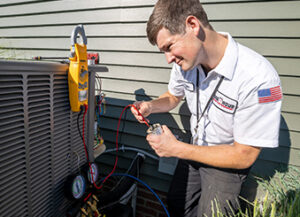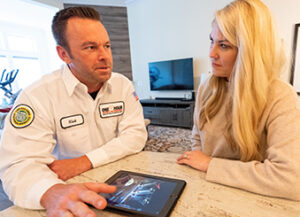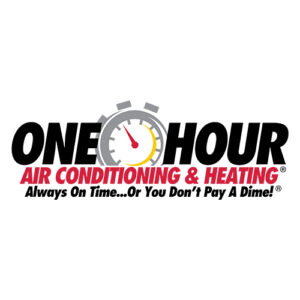Will the compressor fan still run with a bad capacitor?
Your AC’s on the fritz. It’s hot, the air inside feels stale, and you’re standing by the outdoor unit, trying to figure out why it’s making noise but not cooling. You hear a hum, maybe a few clicks, but the compressor fan isn’t spinning—or maybe it is, but the system’s still not doing its job. The question pops into your head: Will the compressor fan run if the capacitor is bad?
We hear this one a lot at One Hour Magic, and the short answer is, it depends. Sometimes the compressor fan might run, sometimes it won’t. It all comes down to which capacitor has failed—and how the rest of the system responds. Let’s break it down so you don’t have to play guessing games with your cooling system.
What the Capacitor Does
Air conditioners usually have two main capacitors, a start capacitor and a run capacitor. Some systems use a dual capacitor that handles both the compressor and the compressor fan motor.
Capacitors act like small batteries. They store and release energy to help the motors in your system start and keep running. Without a functioning capacitor, those motors don’t get the boost they need. They either won’t start, or they’ll run poorly—if at all.
So, Will the Compressor Fan Run If the Capacitor’s Bad?
It depends on which capacitor is bad.
Scenario 1: Compressor Capacitor Fails
If the capacitor for the compressor fails but the compressor fan capacitor is still working, the fan might still run. The blades will spin, and you might feel like something’s working—but you’ll get no cool air. That’s because the compressor isn’t pumping refrigerant.
Scenario 2: Fan Capacitor Fails
If the fan capacitor fails but the compressor capacitor is still working, the compressor fan may not spin at all. You might hear the hum of the compressor trying to run, but the fan just sits there. Sometimes, people try to push-start the fan blades with a stick. That can temporarily get the fan moving, but it won’t fix the problem—and it’s dangerous.
Scenario 3: Dual Capacitor Fails
If your unit has a dual capacitor and it fails entirely, neither the compressor nor the fan will run properly. You’ll likely hear a hum or click, but nothing will move.
In all three cases, the system isn’t cooling your home the way it should. Even if one component is still moving, the balance is off—and that can cause more damage over time.
Signs Your Capacitor Might Be Bad
Not every AC problem points to the capacitor, but here are the signs we see most often when one’s gone bad:
- Compressor fan not spinning even though the unit hums
- AC runs but blows warm air
- You hear clicking or buzzing, then silence
- Unit turns on but trips the breaker
- You have to manually push the fan blades to start them
- The top of the capacitor is bulging or leaking
If you notice any of these, stop using the system and call us. Running your AC with a bad capacitor can burn out the compressor or fan motor—and that turns a small repair into a much bigger bill.
When to Call One Hour Magic
Here’s when we recommend giving us a call:
- Your AC hums but doesn’t cool
- The compressor fan doesn’t spin or spins slowly
- The unit won’t start without a breaker reset
- Your system is over 8 years old and acting up
- You’ve had capacitor issues in the past and want a full checkup
We’ll send a tech out fast, test the components, and walk you through what’s going wrong—without the guesswork.
What We Do on a Service Call
When you call us to check your AC, here’s what the process looks like:
1. Visual Inspection
We look for any obvious signs of damage—burn marks, leaking capacitors, swollen tops. We also check the wiring and motor connections.
2. Electrical Testing
We use a multimeter to check the capacitor’s microfarad rating. If it’s outside the acceptable range or reads zero, it needs to be replaced.
3. Component Check
We test the compressor, fan motor, and contactor to make sure the problem hasn’t caused other damage.
4. Capacitor Replacement
If the capacitor’s bad, we replace it with one that matches the exact specs. We don’t use off-brand or mismatched parts.
5. System Restart and Test
Once the new part is in, we restart the system and check temperatures, airflow, and cycling to make sure everything’s back to normal.
FAQs
Is it safe to push-start the compressor fan blades if they’re not spinning?
No. It might make the fan turn, but the motor still isn’t getting the power it needs. It can overheat, and you could hurt yourself. Better to shut the system off and call us.
How long does a capacitor last?
Most last between 5 to 10 years, depending on heat, power surges, and usage. We check them during every annual maintenance visit.
Can I buy and replace the capacitor myself?
Technically yes—but it’s risky. Capacitors hold a charge even when the power’s off, and the wrong replacement can damage your system. We recommend letting a pro handle it.
How much does a capacitor replacement cost?
It’s one of the more affordable AC repairs, especially when compared to replacing a motor or compressor. We carry replacements on every truck and fix most on the spot.
How do I avoid capacitor failure in the future?
Have us check your system annually. We’ll test the capacitor and other key parts before they fail.
Don’t Let a Small Part Shut Down Your Comfort
A bad capacitor can take your entire AC offline, even if the compressor fan still spins or the system hums like it’s trying. And while it might seem like a small problem, waiting to fix it can burn out more expensive components.
At One Hour Magic, we’ve fixed hundreds of capacitor failures—fast, safely, and without pressure. If your AC is acting up, don’t wait. Give us a call, and we’ll figure it out before the heat has time to settle in.
Your home should feel cool and quiet—not confusing. Let us get your system back on track. We’ve got the tools, the parts, and the experience to handle it the right way—on the first visit.
